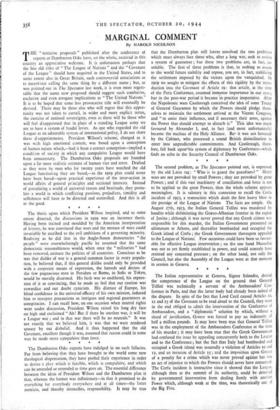MARGINAL COMMENT
By HAROLD NICOLSON.
THE " tentative proposals " published after the conference of experts at Dumbarton Oaks have, on the whole, received in this country an appreciative wetcome. It is unfortunate perhaps that the fine old titles of " The League of Nations " and the "Covenant of the League " should have acquired in the United States, and to some extent also in Great Britain, such controversial associations as to necessitate calling the same thing by a different name ; but, as was pointed out in The Spectator last week, it is even more regret- table that the name now proposed should suggest such combative, exclusive and even arrogant implications as " The United Nations:' It is to be hoped that some less provocative title will eventually be devised. There may be those also who will regret that this oppor- tunity was not taken to curtail, in wider and more explicit terms, the exercise of national sovereignty, even as there will be those who will feel disappointed that in place of a standing League army we are to have a system of feudal levies. As ope who regarded the old League as an admirable system of international policy, I do not share these cf sappointments. President Wilson's scheme, charged as it was with high emotional content, was based upon a conception of human nature which,—had it been a correct conception—implied a condition of society in which any compulsive League would have been unnecessary. The Dumbarton Oaks proposals are founded upon a far more realistic estimate of human vice and error. Drafted as they were by men who for twenty years have watched the old League functioning they are based,—as the 1919 plan could never have been based—upon practical experience of the inter-action in world affairs of general principles and sectional interests. Instead of postulating a world of universal reason and beatitude, they postu- late a world in which conflicting passions, prejudices, timidity and selfishness will have to be directed and controlled. And this is all
to the good. * * * *


























 Previous page
Previous page